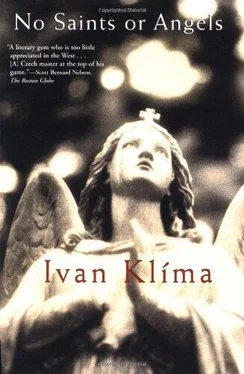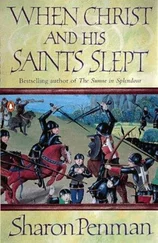Bach wasn't ordinary. Nor was Tchaikovsky: he was just sad when he ordered swans to dance on the shore of a lake of human tears.
Finally the phone rings. I jump up from the armchair and almost knock over a chair. A familiar female voice introduces itself and complains about a sudden toothache.
'But I have no surgery today. Have you tried taking something for the pain?'
'I did. I took two in fact and my head was all muzzy but even so I didn't get a wink of sleep last night.'
It was my husband who first sent this woman to see me. He used to recommend me to his relatives, his colleagues and his acquaintances. Maybe to his mistresses too. He left but they stayed. People leave their partners but stay faithful to their dentists. 'You should have come yesterday.'
'I hoped it would go away on its own.'
'It never goes away on its own. You'll have to go to the emergency clinic.'
'But I don't know anyone there.'
'I can't help you here. All I've got is a pair of pliers and a hand drill.'
'And would it be possible at the surgery?'
I explain that I live on the other side of Prague from my surgery, but she begs me to have pity on her because at the clinic they'd extract the tooth.
It's four o'clock in the afternoon. It's hot outside. I glance at the bottle: I've drunk half of it already. I oughtn't to drive and I don't feel like dragging myself there by metro and tram. But if I stayed here I'd just sit and feel sorry for myself.
An hour later I had treated the Saturday patient. She offered to drive me home and buy me a drink, but I didn't feel like spending any more time in her company. I told her that one of my friends lived nearby and I fancied a bit of a walk. In fact no friends of mine live around here, but if I were to take a half-hour walk in the direction of Zlichov I would arrive at the house where my former and thus far only husband lives and is possibly convalescing.
For years after the divorce I avoided him. If he wanted to see Jana he had to come for her. We would greet each other and I would tell him when he was to bring her home. There was nothing else I needed to tell him and nothing I needed to hear from him.
But now I've nearly forgotten my pain, and what remains of it looks as if it has been outweighed by the pain that gnaws his insides.
I decided to take the riverside path. The wall on the opposite bank has been sprayed with garish graffiti. In front of me a flock of ducks rises out of the undergrowth. Several rowing eights speed by out in the current, as well as a few double kayaks.
When we first got married we used to go canoeing, mostly on the River Lužnice, but also on the Dunajec in Slovakia. We played tennis and I occasionally managed to win a set, although never a match; but I fought bravely, as if I really wanted to win. I knew that for him that was something that counted. Winning against everyone, and everything. In some ways he resembled my father, and not just because his hair was grey.
My one and only — and last — husband revered the victor. He played the hard man, but he wasn't one, for all his muscles. He was plagued with anxiety. He feared his pupils because they could denounce him; he feared the school principal who could ruin his career; but most of all he feared death. A stomach upset, a sore throat or a mole on his arm and his first thought would be the onset of cancer. Whenever he'd ask me about such symptoms there was always a note of anxiety in his voice that he was unable to hide. He expected me to brush aside his fears and reassure him — which is exactly what I did: I'd prescribe him tablets, bring him food and tea to his bedside, help him into his pyjamas. . And no sooner was he well again than he'd be out two-timing me; me and his little girl. I don't know which of us he hurt more, but I for one lost any shred of self-confidence that I had — that's if I had any in the first place.
I really shouldn't think about him. I wasted so much time waiting on him hand and foot, and now I am free of him I waste time remembering him and thinking about him.
The house where he lives was built around the time I was born. It has five storeys; Karel has an attic flat. I took the steps up to it several times when fetching Jana. I never entered the flat, but could see through the open door a wall covered in the diplomas and pathetic medals that he had won at various second-rate tennis tournaments. They had hung in our front hall when we were still living together. He gave me up but hung on to the medals.
I stop at the street corner. I am not sure whether I want to enter. There is a phone booth around the corner. It would be enough to phone him and ask him how he is getting on and whether he needs anything.
The last time I visited him in hospital there happened to be another visitor there. It was some young man: thin and pale and with a mane of reddish hair, but with dark eyes behind small spectacles. His teeth were very white, and his lower jaw jutted slightly. He had beautiful hands with slender fingers — I noticed
them right away. My ex-husband introduced him to me as one of his former pupils. I remembered his name, since it's like my daughter's. He addressed me as 'doctor' and offered to leave straightaway in order not to disturb us, but I reassured him there was nothing to disturb. So we eventually left together, and as soon as we were out of the ward he asked me whether I thought things looked bad for his old teacher. I told him truthfully that the tumour was large and had been neglected, which is always bad.
'That's awful,' he said in alarm. 'I'm terribly sorry. He went on to add that he remembered me from the odd occasions when I'd wait for my husband with our little girl. 'We all used to envy him,' he added, and I had the impression that there was a slight rush of blood to his pale cheeks.
I didn't ask him who they 'all' were, or why they envied my husband his wife, who at the time was playing second fiddle to some slut; instead I quickly took my leave.
Oddly enough what he told me stuck in my memory and I fondly recalled it that evening before I went to sleep. And I even remember his words now, almost three weeks later, and the thought occurs to me that the young man just might happen to be visiting him now.
It's hardly likely, though.
I walk to the telephone booth, but still hesitate. The crowlike soul that flew out of his head last night frightens me. At that moment I catch sight of him: the crow. He is walking, or rather shambling, along the opposite pavement. He stoops slightly and is thin, and even on this warm day is wrapped in an overcoat. The sportsman leans on a stick. But he is still walking. He has been for a lonely walk somewhere. How I cried when he left me. Now I could only cry for him, this abandoned soul.
I don't call out to him or run after him. I watch him shamble back to the house where he lives. What duty do I owe to a man I used to live with and who is unlikely to be among the living much longer?
He occupies my thoughts too much. Somewhere deep down in my soul there is a sense of guilt that cries out that I wasn't a good enough wife to him, which is why he left me, and also maybe why he neglected his illness — he had no one to care for him. I turn away and start walking to the tram stop.
5
I'll be thirty already at the end of November. I was a Prague Spring boy. In other words I was endowed with hope, or false hopes, more likely.
My mother was a primary-school teacher. She was thirty-five when I was born. She married late although she had known Dad since she was very young. But he was jailed before they could marry. Dad had been a Scout leader and wanted to remain one even after the Scouts were banned. Mum waited nine long years for him, for which I admired her. When he came back, Dad apparently told her she was the best woman in the world, but he didn't want children. He said there was no point in bringing new slaves into the world. And then came that brief period of hope that justice would be restored. All such hopes that justice will suddenly drop from heaven are mostly false, as I fairly soon discovered. But I was glad that twenty years later Dad lived to see the end of the regime that ruined his youth. Dad died seven years ago, when enthusiasm still reigned after that long-awaited and yet sudden end of Bolshevism.
Читать дальше












